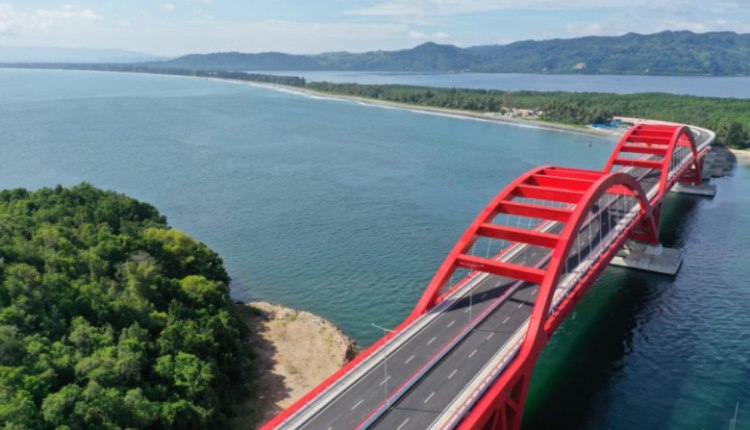The Acceleration of Papuan Development Has a Positive Impact on Society
By: Devaryo Valarie )*
The government continues to accelerate development in the Papua region to provide a positive and significant impact on society. Various strategic breakthroughs were presented to support the acceleration and smoothness of development programs in Papua. Moreover, during the leadership era of President Joko Widodo (Jokowi), the government was very aggressive in carrying out equitable development throughout Indonesia, including Papua. This commitment is proof that the state is present and pays high attention to the interests of the people of Cenderawasih Earth.
One of the programs launched by the government for Papua’s development is the Papua Development Acceleration Master Plan (RIPPP) and the Papua Development Acceleration Information System (SIPPP). RIPPP is an integrated plan between sectors and regions that prioritizes the principles of good financial management, which was prepared jointly with Ministries/Agencies (K/L), Regional Government, and Papuan community leaders who prioritize the principles of good financial management. Meanwhile SIPPP is an integrated information system platform within the RIPPP framework.
Regarding this matter, Vice President (Wapres) KH Ma’ruf Amin as Chair of the Steering Committee for the Acceleration of Development of Special Autonomy for Papua (BP3OKP), conveyed four strategic directions to support the acceleration of Papua’s development. First, prepare and implement comprehensive program designs that have a direct impact on improving community welfare within the 2022-2041 RIPPP framework.
The Vice President also encouraged planning and budgeting for RIPPP and SIPPP programs to be carried out by considering the needs of Indigenous Papuans (OAP). Apart from that, focus on efforts to improve the quality of education, reduce extreme poverty, and overcome stunting, so as to improve the standard and quality of life of the Papuan people. Efforts to implement programs of course need to be supported by strengthening coordination, synergy, collaboration and cooperation between the central government, regional governments, the private sector and the community.
Second, the Vice President appealed to optimize the use of SIPPP. Because, SIPPP is not only a tool for monitoring and evaluating the acceleration of development and special autonomy for Papua, but also as a driving force for steps to consolidate, synchronize and harmonize all data and information on Papua’s integrated development planning.
Third, expand the involvement of Papuan community leaders in preparing action plans for Papua’s accelerated development each period to ensure that the aspirations and needs of the Papuan people are accommodated.
Fourth, the Vice President requested that this program continue to ensure the ongoing development acceleration process can run effectively and sustainably. He hopes that all stakeholders can carry out this task with full responsibility and integrity. Furthermore, the Vice President also invited all components of society in Papua to work together to create a Healthy, Smart and Productive Papua.
Previously, the Minister of National Development Planning, Suharso Monoarfa, explained that the preparation of the 2022-2041 RIPPP, which was coordinated by the Ministry of National Development Planning/Bappenas, was a mandate of Law Number 2 of 2021 concerning the Second Amendment to Law Number 21 of 2001, concerning Special Autonomy (Otsus). For Papua Province.
This RIPPP was prepared jointly with Ministries/Agencies, Regional Government, and Papuan community leaders, which is an integrated plan between sectors and regions that prioritizes the principles of good financial management. Currently, RIPPP has been stipulated as Presidential Regulation Number 24 of 2023.
To support this synergistic planning, according to the mandate of Presidential Decree no. 24 of 2023, the Ministry of National Development Planning/Bappenas together with the Ministry of Finance, Ministry of Home Affairs, and the Vice President’s Secretariat, as well as Regional Governments need to develop the Papua Development Acceleration Information System (SIPPP). For this reason, the 2022–2041 RIPPP and SIPPP launch activities are important stages in Papua’s development.
Various ministries/institutions also support the acceleration of development in Bumi Cenderawasih, including the Ministry of Defense encouraging three production battalions to South Papua to increase agricultural activities. The battalion is tasked with starting from seeding to harvesting, with plans to utilize community land.
Chief of Staff of the XVII Cendrawasih Regional Military Command, Brigadier General Hariyanto, said that the Ministry of Defense is encouraging the acceleration of agriculture in South Papua with the input of three production battalions. The battalion was tasked with agricultural development, from nursery care to harvest. A portion of the profits will be distributed to land owners, while the army will manage the land initially until it is handed back to the community. In this scheme, 40 percent of the profits obtained will be distributed to land owners, as a form of appreciation for their cooperation.
In the initial stage, the TNI will be responsible for working on the land. However, once the results look satisfactory, management will be handed over to the community independently. This initiative shows the Ministry of Defense’s commitment to supporting development in remote areas and providing a positive impact on the welfare of the people of South Papua. It is hoped that this step will help increase agricultural productivity in the South Papua region, as well as provide direct economic benefits to the local community.
Accelerating development in Papua must be carried out by involving the central and regional governments as well as all elements of society. It is believed that this will provide an optimal positive impact to support the interests of society in a sustainable manner. In this way, the benefits of development in Papua will not only be felt by today’s people but most importantly by future generations.
)* The author is a student from Papua in Surabaya
